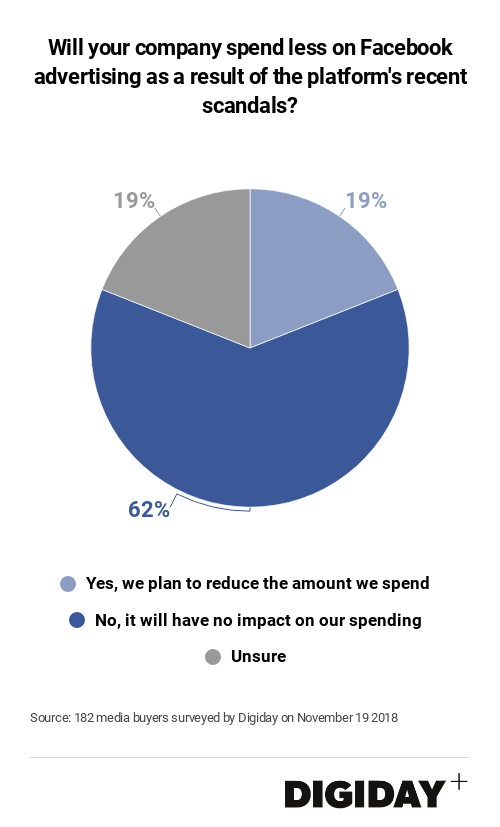 The ad industry is up in arms, individual marketers are suing Facebook for misleading and potentially fraudulent practices, and consumer trust is plummeting. So why aren’t brands changing their spending habits on the social platform?
The ad industry is up in arms, individual marketers are suing Facebook for misleading and potentially fraudulent practices, and consumer trust is plummeting. So why aren’t brands changing their spending habits on the social platform?
“Facebook advertisers are once again turning a blind eye to the issues plaguing the social media giant after a New York Times report detailed a pattern of willful stonewalling, delaying and obfuscating around a series of urgent problems,” writes Garett Sloane in Ad Age.
Sloane interviewed some industry executives to try to understand this “who cares” attitude on the part of brands.
“It’s kind of amazing that no one cares at all,” a managing partner at a major advertising agency told Ad Age. “All these companies are talking about purpose, and higher alignments for their brands and not a single client has raised a red flag about any of this at Facebook.”
Some execs have been calling for more accountability in digital advertising, with Procter & Gamble’s Chief Brand Officer Marc Prichard famously telling the industry to “grow up” last year. Yet in the midst of mounting lawsuits and data breaches, the call seems to be falling on deaf ears. Not only is Facebook generally mute on their role in all of this, brands have not significantly reconfigured their ad spend.
“Nothing that’s happened materially changes the way our business is marketing on Facebook,” says a media and entertainment advertising executive.
“No one has yet heard of a client pausing or even easing off the gas,” said another agency executive to Ad Age. (Many of the execs interviewed by Ad Age for this piece contributed only on the condition of anonymity. That in itself is pretty strange. What are they afraid of?)
Some seem to believe that Facebook is a required platform in a modern ecosystem, and brands have an obligation of sorts to help support it.
“Daryl Lee, global CEO of UM, a full-service marketing and media agency network of IPG Mediabrands, says brands will keep working with Facebook because it’s in everyone’s interest that the social network is a safe place where people connect and brands participate,” Sloan explains.
“This is not a question of whether Facebook has no morals but whether they have all the necessary controls in place to make the Facebook environment as brand safe as possible,” Lee wrote in a statement.”
Whether or not that is happening to the level that brands require to feel safe, consumers are dialing out. If an ad appears on a platform they don’t trust, doesn’t it make more sense to pull those ads?
Kit Yarrow, a consumer psychologist, says yes.
“It’s such an easy win because it deals with trust, the No. 1 consumer hot-button issue,” she said. “In fact, I’d just make that case, ‘what we value is honesty and transparency–if we can’t trust our partners we can’t do business with them.'”
Full stop.

November 25, 2018, 9:09 pm
Hey David,
You need to expose the high level corruption that exists between the ad agencies and the marketing directors of big public companies that try to justify wasting Big Brands budgets in useless FAKEBOOK that has created and sold
and illusory user base (SCAM).
This is no doubt the biggest FRAUD in the history of advertising